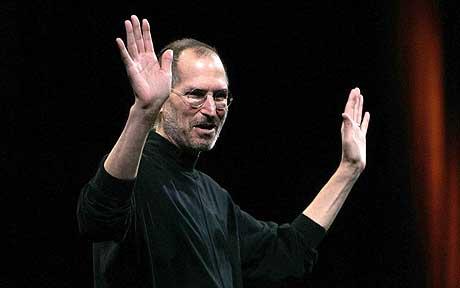
The Silver Lining
To the iCloud and Beyond!
by Mark Taoilinn
In its press release earlier this week Apple did something completely out of character - they preannounced a new product. Apple's new service iCloud is to be launched by Steve Jobs at Apple's Worldwide Developers' Coneference (WWDC) this Monday, sparking rumour, speculation and excitement this week about what the computer giant might pull out of the bag. It's also refueled the debate about cloud computing in general and shone a light on this year's biggest new trend.

It can be argued that iCloud is perhaps Apple's worst kept secret. Rumours about a new Apple cloud service, which have been circulating for quite some time, were driven to fever pitch at the beginning of April when Apple acquired the domain name iCloud.com from Swedish cloud services provider Xcerion for $4.5Million. Add that to the $1Billion data centre that Apple are building in North Carolina and you get a market poised and waiting for a 'surprise' Apple announcement about their slant on this year's hottest new IT craze. But what is the iCloud, and exactly what services will it offer? Well, in Apple's typically secretive style, we don't know! But that doesn't stop everyone guessing. We pundits have it that the iCloud service will be Apple's new music offering to rival the music lockers available from Amazon and Google. The Wall Street Journal has confirmed that Apple has signed deals with major studios and record labels to allow Apple users stream content directly from the cloud. The clever bit, we expect, is that Apple may scan your computer to ascertain what music you currently own and then make those titles available to you to stream 24/7 to any apple device via the iCloud, saving users the messy and time-consuming task of selecting music and uploading it to their phone or device. Clever eh!
The 'Future of Cloud Services'
The timing of this announcement, alongside the much anticipated iOS 5 release and the long expected Lion update for Mac OS X, might be quite revealing. If Apple is integrating the iCloud into iOS 5 and offering it as a free service to their users, what does this mean for the future of their iPhone and iPad hardware? Android have managed to surpass iOS as the leading mobile OS worldwide by offering low cost alternatives to iOS devices. iCloud may very well reduce the storage capacity requirements of Apple devices - have Apple found a way to compete on a low cost platform? And, if Apple do start to reduce the storage capacity of its devices by increasing reliance on the cloud, how will this affect app development? Are Apple changing the face of mobile computing, again, as the announcement in April that Apple were putting a team of people together to build "the future of cloud services" would seem to suggest. Once again we just don't know.
The Year of the Cloud.

What is clear however is that 2011 is going to be the year of the cloud. It's not just Apple: Microsoft, Google, businesses big and small, charities, developers and end users are all starting to dream about the silver lining of cloud computing. "At Microsoft, for the cloud, we're all in," Microsoft CEO Steve Ballmer told University of Washington computer science students last spring; "It's just a great time to be all-in and really drive the next generation of technology advances." Not to be outdone Dave Girouard, Google's president of enterprise, had this to say: "Chromebooks is actually a huge leap forward for cloud computing, we're excited about putting more pieces of the puzzle together. Our aim is to be No. 1 in cloud computing." Hewlett Packard's new CEO Leo Apotheker is refocusing his whole company around a cloud strategy. The reasoning is simple: using a cloud based infrastructure is often cheaper than maintaining your own physical servers. Cloud computing offers business savings by increasing efficiency (by outsourcing to specialists), agility (firms can scale up or scale down server needs as required) and flexibility (you pay for what you use). And for computer firms and developers alike business customers are, well, big business. Whether it's a public cloud (like the iCloud) or a private cloud, the challenge for developers is to create the server and mobile solutions to maximize return on the investments that companies have made into cloud networks.
Investment
If research firm Gartner is to be believed, Cloud Computing will represent the biggest single investment by firms in technology in 2011. A study from research firm Unisys backs up this data: companies were asked to name their priorities for IT investment in 2011. 44% of those surveyed listed cloud computing as their top IT priority this year and 80% of companies said they were planning some kind of cloud solution. Of these, about half will invest in a private cloud, 15% in a public cloud and 21% in a hybrid cloud - incorporating both public and private components. In fact, market research firm Forrester Research forecast in its recent report that the global cloud computing market will reach US$241 billion in 2020 compared to US$40.7 billion in 2010. That's a huge growth in investment.
The Cloud in Enterprise:
Apple's investment in the iCloud gives developers the opportunity to develop new apps and to integrate new features for end consumers. The investment in private clouds, popular in enterprise, opens up new avenues of opportunity for developers:
- Software as a Service (SaaS)- Also known as "on demand software" SaaS is software which is deployed over the internet and used by someone on a PC or LAN. Customers "pay as you go" to use the cloud providers license, rather than purchasing a license themselves. As demand for cloud services grow we will see huge growth in SaaS and developers will need to rethink their business models to account for these pay per usage customers.
- Platform as a Service (PaaS) - This is provision of a computing platform and the development and deployment of associated applications to enterprise via the cloud. Applications can be bespoke or, more commonly, customized from existing solutions. Since cloud computing allows businesses to step up or scale back computing needs as required PaaS is an excellent way for developers to quickly deliver targeted solutions to their enterprise clients.
- Infrastructure as a Service (IaaS) - referred to as "utility computing". Instead of purchasing servers, software, networks and storage space, enterprise clients outsource all of these requirements through the cloud. The cloud provider owns and maintains the equipment, not the end user. Thus the end user has much more flexibility to scale up or down their storage and computer needs to meet changing business requirements. Meanwhile the providers can achieve economies of scale by ensuring the servers, in particular, are fully utilized across a range of clients. Clients benefit by not paying out to purchase servers that they only use a small percentage of and developers can easily replicate earlier made environments on virtual machines to meet clients' growing needs.
The Silver Lining
If Apple do manage to pull off the iCloud properly - and hopefully replace MobileMe, their only really disappointing product in recent years - the benefits are clear. Apple will once again be lauded for bringing the enjoyment of multimedia to dizzying new heights of user friendliness. For the rest of us there's lots to learn from this: through cloud computing end users will expect round the clock access to their data and programs, from wherever they are, with whatever device they happen to be using. Not every developer needs to stream music to millions of users. But the investment in cloud computing means that all developers will need to go back to their server roots and once again create solutions to access, edit and collate data stored on shared servers. If a developer can grant end users access to this data by way of high quality user interfaces on both mobile and desktop - well, that developer really will end up on Cloud 9, just like Apple.
LiveCode gives you everything you need for cross platform cloud development. Create great front end applications for Mobile, Desktop and Web. Manipulate the server backend using LiveCode Server. A minor release to this LiveCode Server today made it even easier to install this on your own Linux server, and to start experimenting with server-side scripting services in LiveCode.LiveCode You can upgrade to LiveCode Server here or buy it as part of new LiveCode license here.
|
About the Author
Mark Taoilinn is Marketing and Communications Analyst for RunRev Ltd.
|
| 


|



 Tweet
Tweet